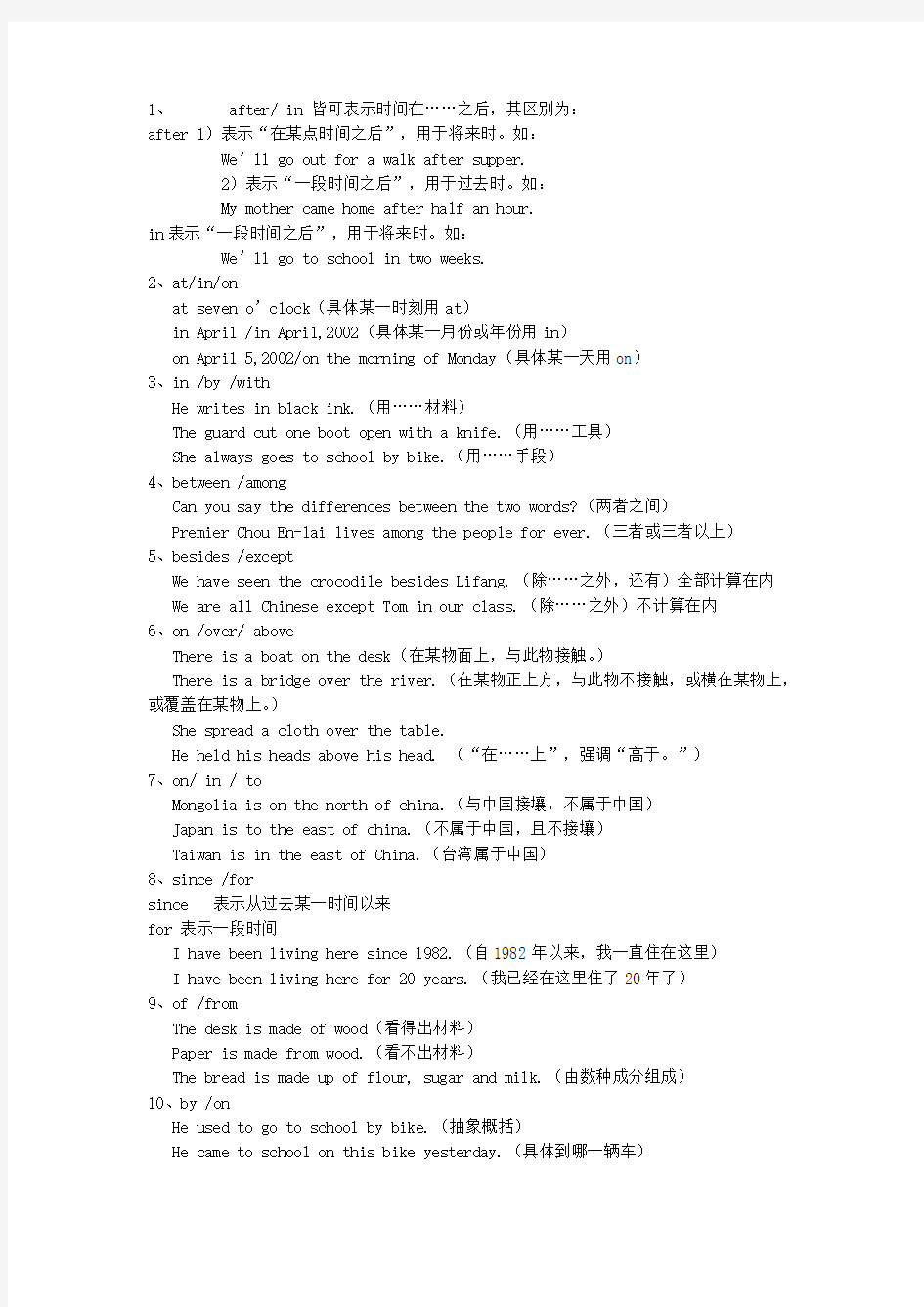
常用易混淆介词辨析
- 格式:doc
- 大小:20.00 KB
- 文档页数:3


1、 after/ in 皆可表示时间在……之后,其区别为:
after 1)表示“在某点时间之后”,用于将来时。如:
We’ll go out for a walk after supper.
2)表示“一段时间之后”,用于过去时。如:
My mother came home after half an hour.
in表示“一段时间之后”,用于将来时。如:
We’ll go to school in two weeks.
2、at/in/on
at seven o’clock(具体某一时刻用at)
in April /in April,2002(具体某一月份或年份用in)
on April 5,2002/on the morning of Monday(具体某一天用on)
3、in /by /with
He writes in black ink.(用……材料)
The guard cut one boot open with a knife.(用……工具)
She always goes to school by bike.(用……手段)
4、between /among
Can you say the differences between the two words?(两者之间)
Premier Chou En-lai lives among the people for ever.(三者或三者以上)
5、besides /except
We have seen the crocodile besides Lifang.(除……之外,还有)全部计算在内
We are all Chinese except Tom in our class.(除……之外)不计算在内
6、on /over/ above
There is a boat on the desk(在某物面上,与此物接触。)
There is a bridge over the river.(在某物正上方,与此物不接触,或横在某物上,或覆盖在某物上。)
She spread a cloth over the table.
He held his heads above his head. (“在……上”,强调“高于。”)
7、on/ in / to
Mongolia is on the north of china.(与中国接壤,不属于中国)
Japan is to the east of china.(不属于中国,且不接壤)
Taiwan is in the east of China.(台湾属于中国)
8、since /for
since 表示从过去某一时间以来
for 表示一段时间
I have been living here since 1982.(自1982年以来,我一直住在这里)
I have been living here for 20 years.(我已经在这里住了20年了)
9、of /from
The desk is made of wood(看得出材料)
Paper is made from wood.(看不出材料)
The bread is made up of flour, sugar and milk.(由数种成分组成)
10、by /on
He used to go to school by bike.(抽象概括)
He came to school on this bike yesterday.(具体到哪一辆车)
11、of /for
It’s kind of you to come to see me.(既说明不定式本身特点,又说明逻辑主语的品性)
It’s important for you students to learn English well.(只说明不定式本身的特征)
12、of /in
This is the most interesting of all the stories.(从个体的集体着眼)
China has the largest population in the world.(从总体概括着眼)
13、of /about /on表示“谈及,论述”
Do you know of American singer John Denver?(涉及浅层关系)
I have never heard about him.(表示谈论等深一步的关系)
This book is on grammar.(以……为主要内容)
14、through /past/across
The new railway runs through the small town.(穿过)
He walked slowly past the tall building.(从旁边经过)
Mary walked across the park to do some shopping.(强调从一边到另一边)
15、by/ with通过……手段
We write with a pen.(表示较具体的事物)
There’s nothing to gain by waiting.(表示抽象)
16、despite = in spite of(介词) / although(连词)
despite 是介词,后面接名词或动名词,不能跟句子
although是连词,后面要跟句子。
Although I was ill yesterday, I still went to school.
Despite failure in the exam, I still have a chance to win in the term.
17、as /like
as 1)用作介词时意思为“作为……,充当”如:
She acted as an interpreter.
2)用作连词时意思为“像……一样;当,由于”
As it was cold, I didn’t go outside.
like 用作介词,意思为像……一样
John sings like a nightingale.
18、by day(指白天)/ by the day(按日计算)
I worked here by day and I am paid by the day.
worth 的用法
worth,worthy,worth-while都为adj. 意为"值得"。
1. worth: be worth + n. 当名词为金钱时,表示"…… 值得……"
be worth doing sth. "……某事值得被做"
The question is not worth discussing again and again.
2. worthy:be worthy of +n. 当名词为抽象名词时表示"……值得……"
be worthy to be done "某事值得被做"
The question is not worthy to be discussed againand again.
3. worth-while: be worth-while to do sth "值得做某事"